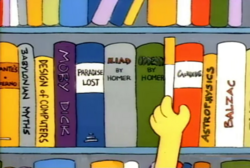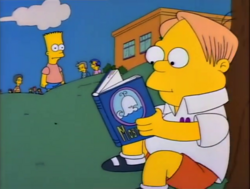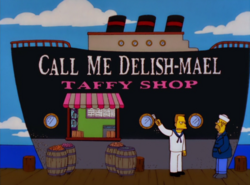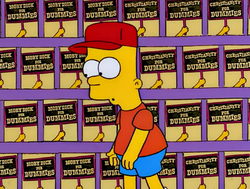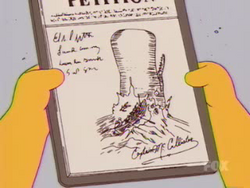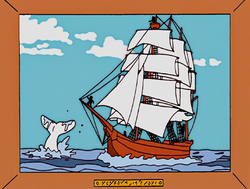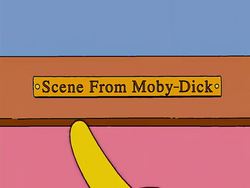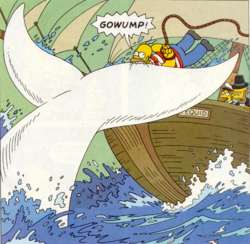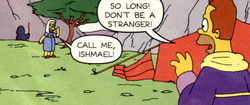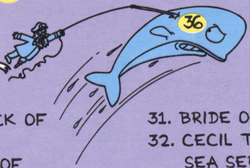
Difference between revisions of "Moby-Dick"
Wikisimpsons - The Simpsons Wiki
m (→External links: replaced: {{wikipedialink → *{{Wikipedialink, **{{Wikipedialink → *{{Wikipedialink) |
Snowball II (talk | contribs) |
||
| (7 intermediate revisions by 3 users not shown) | |||
| Line 1: | Line 1: | ||
| − | {{ | + | {{Italic title}} |
| − | {{ | + | {{For2things|the references to Moby Dick in The Simpsons|the book that exists within The Simpsons universe|Moby Dick|the character|Moby Dick (character)}} |
| − | + | ||
| − | '''''Moby-Dick''''' is a novel by {{ | + | '''''Moby-Dick''''' is a novel by {{W|Herman Melville}} published in 1851. The book is told from the point of view of the sailor Ishmael on the ship ''Pequod'', and details his captain Ahab's desire for revenge on the white whale Moby Dick, who bit off his leg. |
== References to ''Moby-Dick'' in ''The Simpsons'' == | == References to ''Moby-Dick'' in ''The Simpsons'' == | ||
| Line 21: | Line 21: | ||
{{TB|14}} | {{TB|14}} | ||
{{TB|"[[Bart Gets an "F"]]"}} | {{TB|"[[Bart Gets an "F"]]"}} | ||
| − | {{TB|[[ | + | {{TB|[[Martin]] is seen reading ''Moby-Dick''.}} |
{{TBT|}} | {{TBT|}} | ||
{{TB|[[Season 4|4]]}} | {{TB|[[Season 4|4]]}} | ||
{{TB|76}} | {{TB|76}} | ||
{{TB|"[[Last Exit to Springfield]]"}} | {{TB|"[[Last Exit to Springfield]]"}} | ||
| − | {{TB|Before he deactivates all of the town's power, [[ | + | {{TB|Before he deactivates all of the town's power, [[Mr. Burns]] comments "from Hell's heart I stab at thee", a quote made by Captain Ahab to the white whale.}} |
{{TBT|}} | {{TBT|}} | ||
{{TB|[[Season 7|7]]}} | {{TB|[[Season 7|7]]}} | ||
| Line 41: | Line 41: | ||
{{TB|251}} | {{TB|251}} | ||
{{TB|"[[Insane Clown Poppy]]"}} | {{TB|"[[Insane Clown Poppy]]"}} | ||
| − | {{TB|Among the large selection of "For Dummies" books is ''[[Moby Dick for Dummies]]''. [[ | + | {{TB|Among the large selection of "For Dummies" books is ''[[Moby Dick for Dummies]]''. [[Bart]] looks at the book's intro, which reads "Call me Ishmael, dummy".}} |
{{TBT|[[File:Scuse Me While I Miss the Sky Moby Dick.png|250px]]}} | {{TBT|[[File:Scuse Me While I Miss the Sky Moby Dick.png|250px]]}} | ||
{{TB|[[Season 14|14]]}} | {{TB|[[Season 14|14]]}} | ||
{{TB|307}} | {{TB|307}} | ||
{{TB|"[['Scuse Me While I Miss the Sky]]"}} | {{TB|"[['Scuse Me While I Miss the Sky]]"}} | ||
| − | {{TB|Captain McCallister signs [[ | + | {{TB|Captain McCallister signs [[Lisa]]'s petition with a picture of the Pequod being destroyed by Moby Dick.}} |
{{TBT|}} | {{TBT|}} | ||
{{TRs|[[Season 15|15]]|2}} | {{TRs|[[Season 15|15]]|2}} | ||
{{TB|318}} | {{TB|318}} | ||
{{TB|"[[The Fat and the Furriest]]"}} | {{TB|"[[The Fat and the Furriest]]"}} | ||
| − | {{TB|Lisa tells [[ | + | {{TB|Lisa tells [[Homer]] that the point of ''Moby-Dick'' is that revenge can't be brought on an animal, which Homer was planning on doing to a [[bear]]. However, Homer believes the point of the book is to "be yourself".}} |
| − | {{TBT|[[File:Scene from Moby | + | {{TBT|[[File:Scene from Moby Dick.png|250px]]<br>[[File:Scene from Moby Dick 2.png|250px]]}} |
{{TB|323}} | {{TB|323}} | ||
{{TB|"[[Diatribe of a Mad Housewife]]"}} | {{TB|"[[Diatribe of a Mad Housewife]]"}} | ||
| − | {{TB|The painting of the ship behind the couch is revealed to be called "[[Scene from Moby Dick|Scene From Moby-Dick]]". [[ | + | {{TB|The painting of the ship behind the couch is revealed to be called "[[Scene from Moby Dick|Scene From Moby-Dick]]". [[Marge]] looks at the painting and is motivated to write a novel about whaling, which she thinks hasn't been done before.}} |
}} | }} | ||
| Line 67: | Line 67: | ||
{{TB|{{BSTHOH|1}}}} | {{TB|{{BSTHOH|1}}}} | ||
{{TB|''[[Call Me Homer]]''}} | {{TB|''[[Call Me Homer]]''}} | ||
| − | {{TB|The plot is based on ''Moby-Dick'', where [[ | + | {{TB|The plot is based on ''Moby-Dick'', where [[Grampa]] tells the story of his great-great grandfather, {{ap|Homer Simpson|Call Me Homer}}, an adventurer on the seas who caught the white whale Moby Dick.}} |
{{TBT|[[File:Bart Simpson's Bible Stories Moby Dick.png|250px]]}} | {{TBT|[[File:Bart Simpson's Bible Stories Moby Dick.png|250px]]}} | ||
{{TB|{{SC|62}}}} | {{TB|{{SC|62}}}} | ||
| Line 92: | Line 92: | ||
{{TB|''[[The Simpsons: Road Rage]]''}} | {{TB|''[[The Simpsons: Road Rage]]''}} | ||
{{TB|If the player picks up Captain McCallister and takes a long time to reach his intended destination, one of his possible comments is "Call me Ishmael. And late."}} | {{TB|If the player picks up Captain McCallister and takes a long time to reach his intended destination, one of his possible comments is "Call me Ishmael. And late."}} | ||
| + | {{TBT|}} | ||
| + | {{TRs|''[[The Simpsons: Hit & Run]]''|2}} | ||
| + | {{TB|After completing the mission "[[Level 3 (The Simpsons: Hit & Run)#Fishy Deals|Fishy Deals]]", Lisa refers to Captain McCallister as a "stupid Ahab".}} | ||
| + | {{TBT|}} | ||
| + | {{TB|If the player runs over Captain McCallister, one of his possible comments is "Call me PO'd".}} | ||
}} | }} | ||
| + | |||
== External links == | == External links == | ||
*{{Wikipedialink}} | *{{Wikipedialink}} | ||
| − | {{Cultural references}} | + | {{Cultural references|books=yes}} |
| − | |||
| − | |||
Latest revision as of 05:43, June 3, 2024
- This article is about the references to Moby Dick in The Simpsons. For the book that exists within The Simpsons universe, see Moby Dick. For the character, see Moby Dick (character).
Moby-Dick is a novel by Herman Melville published in 1851. The book is told from the point of view of the sailor Ishmael on the ship Pequod, and details his captain Ahab's desire for revenge on the white whale Moby Dick, who bit off his leg.
Contents
References to Moby-Dick in The Simpsons[edit]
Episodes[edit]
|
Comics[edit]
|
Books[edit]
|
Video games[edit]
|
External links[edit]

